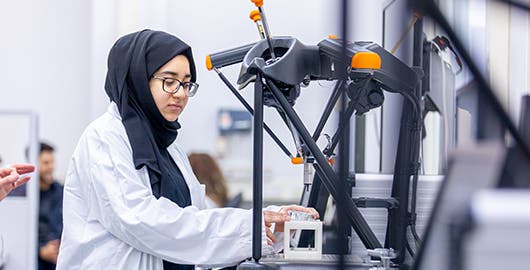Accelerated International Foundation Year in Engineering, Physical Science and Computer Science
With the Accelerated International Foundation Year, you’ll gain all the high-quality academic and English language teaching you need for success at Cardiff University in just 22 weeks. Once you successfully complete this intensive programme and achieve the required grades, you can progress to the first year of your chosen undergraduate degree.
You will study a subject route depending on your chosen progression degree. You have two options: Engineering, Physics and Mathematics or Computing. The route you choose will impact the modules you study at the International Study Centre.
Key facts
- Entry Point: March
- Length: 22 weeks
Entry requirements
Check our academic and English language entry requirements
Fees
Visit the Fees page for full details.
Your fast-track route to an exciting career
With the Cardiff University International Study Centre, you’re on the way towards a new future. The Accelerated International Foundation Year prepares you for your life and studies at Cardiff University. Once you’ve progressed to Cardiff, your degree programmes are enhanced by industry collaboration, so you can gain the skills, experience, and professional network you need to achieve your goals.
What will I study?
You will study a blend of core modules, designed to prepare you for studying at a UK university, and subject-specific modules where you’ll gain the knowledge needed for your degree.
Academic English Skills
The Academic English Skills course teaches students the specific academic language skills they need to develop for success at Cardiff University. The course focuses on the receptive (listening and reading) and productive (speaking and writing) skills through practice in semi and authentic task-based activities which build a strong foundation in preparation for each student's future studies. This critical module places particular emphasis on developing academic reading and research skills; research-based writing along with presentation and seminar speaking skills.
Pure Mathematics 1 & 2
The overall aim of these modules is to provide students with a foundation in core mathematical concepts and theories in engineering and science disciplines. The module supports students to recall mathematical facts, concepts and techniques, and develop the mathematical background required for their studies at Higher Education in the UK.
Design Thinking
The overall aim of the module is to improve students’ understanding and critical appreciation of the ideas, practices and techniques in relation to design thinking processes, focusing particularly on how to structure a project, how to conduct research from a variety of primary and secondary data, and how to produce and generate ideas with on-going evaluation and reflection. Students will practise each stage of the creative process based on a given brief, considering the needs of clients and for a specific audience. Students will practise with appropriate and professional communication skills to boost their confidence in participating and discussing ideas. In addition, this is a preliminary module which consolidates fundamental skills for all future learning in a design project.
Physics
The overall aim of the module is to develop students’ knowledge and understanding of foundations in physics including phases of matter, thermal properties of matter, elastic properties of solids, waves, electrical circuits, and basic data analytics skills. The module aims to develop students’ physics background, providing them with the sound foundation required for their studies at Higher Education in the UK. The module focuses on student-led activities to boost their confidence when carrying out practical tasks and applying their mathematical skills to solve physics problems. Additionally, students will build their technical English writing skills to critically analyse and discuss results obtained from practical tasks.
Route modules
Applied Mathematics
The overall aim of the module is to provide students with a foundation in the relationship between mathematical models and methods that can be used to solve practical problems. Students will develop a solid understanding of mathematical notation and relevant technical terminology. The module aims to support students’ transition to undergraduate studies in physical sciences and engineering disciplines at the University of Cardiff.
Statistics
The aim of the module is to provide students with a foundation in core statistical concepts. The module supports students to recall principles and concepts in statistics and develop the mathematical and statistical background, required for their studies at Higher Education in the UK.
Fundamentals in Computing
This module sets out essential concepts and skills relating to the ability to use computational thinking and coding to create simple computer programs. Students will develop knowledge and understanding of computer systems and the principles of computing (including programming) and how these are applied to the solution of real problems. The emphasis in this module is to continue to develop the students’ relevant computing skills while pointing the contents particularly towards the demands of first year undergraduate study in relevant subject areas.
Statistics
The aim of the module is to provide students with a foundation in core statistical concepts. The module supports students to recall principles and concepts in statistics and develop the mathematical and statistical background, required for their studies at Higher Education in the UK.
